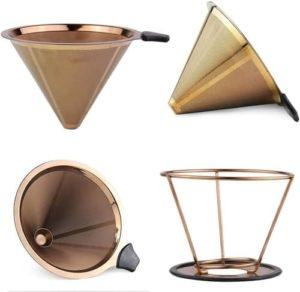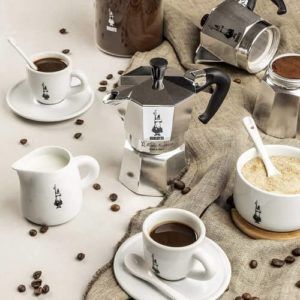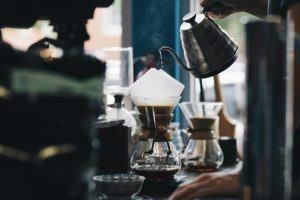Why the Right Type of Water Matters for Coffee Making?
If you are a coffee lover just like me, then you will know there are many constituent parts when making a high quality coffee brew. Without any doubt though, the main ingredient that is overlooked the most, is the type of water we use to make our favourite brew.
It is worth noting though that the water is critically important to the final flavour of the coffee that you drink. For many years I personally just looked for good quality coffee beans, and made sure that I had a burr coffee grinder, that would give me a consistent grind.
Both of those are of course very important, but I did eventually discover that water is equally important. The vast majority of coffee drinkers will use tap water. It is just a convenient thing to do, and it is certainly the cheapest option.
The quality of water in the UK also varies quite a lot. So while that may be excellent in some areas, it is not just as good in other areas. The quality and taste of water will always be determined by its actual source.
Generally speaking though water throughout the UK is one of the highest standards of quality in the world.
Why is Water Quality so Important for Coffee Drinkers?
If someone had told me a couple of years ago, that the quality of water makes any difference in coffee I simply would not have believed them. It was only when I read up about that, and also tried it for myself, that I became a convert.
Most black coffee drinks are made from 98% water.
That little statistic is very well worth bearing in mind. Think of an Americano, Latte, Cappuccino etc and you will see that the volume is indeed predominantly water or h2o, to give is its scientific name.
It is so easy to just reach for the tap and fill up the kettle or the water tank in our coffee machine. However, I would urge you just to think twice about doing that.
Until you have at least tested using bottled water or filtered water, then I would strongly urge you to test it out. I believe you will see a huge difference, in both the aroma and the flavour of your favourite coffee beans.
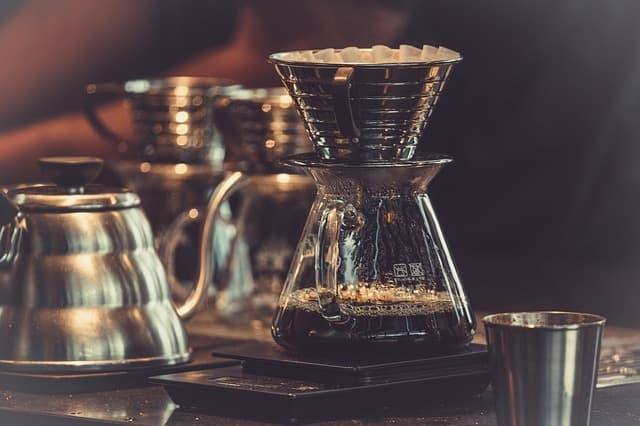
Water Quality Varies in the UK
As I mentioned earlier the quality of water in the UK is excellent but it does vary quite a lot. You may be familiar with the term hard water. No matter what type of water that you get into your home, it will have gone through some type of cleaning and filtering process.
This is done at huge water plants and then the water is piped into our homes. That water is safe to use for bathing and also safe to use for drinking. Now if you want to make it even better, then I would strongly recommend using some type of filtering system.
Tap water, no matter how high the quality, still contains impurities. Any means of filtering will help improve the quality of the water, and as such improve the taste of your coffee.
That explains the huge rise in sales of items such as water filter jugs.
How is Water Impurity Measured?
I want to avoid getting over technical about water impurity, because believe it or not, it is a bit of a science. It is good though to know enough detail though, as that will help explain why getting good quality for your water will make a huge difference.
Pure water by definition and according to the Water Research Center should be odourless, tasteless and colourless. That is rare indeed and usually only found in scientific labs.
Coffee experts and water experts measure the purity of water by using a measurement known as "totally dissolved solids." (TDS) These solids are typically minerals, salts and metals.
These will, no matter how small or large the amount, impact on the taste of your water, and as a result the taste of your coffee. TDS is measured in parts per million (ppm). The lower this TDS number is then the higher the quality of the water will be, or the purer it will be.
This TDS will vary for tap water throughout the UK, but it can get as high as 500 ppm. The recommended TDS level for making coffee should be anything between 50-100 ppm. As you can see from this, and generally speaking most tap water will be well above the recommended level.
That is because tap water may include substances like chlorine, which is added to the main water and also small traces of metals such as copper and iron, which comes from the TDS..
There is an association known as "The Specialty Coffee Association of America" and this 50-100 ppm is their recommendation. Many specialist coffee shops, and especially those at the higher end, actually use water with as close to a zero ppm, as they can buy.
This is achieved by using what is called a reverse osmosis filtration system. Now I am going to stop here, because that is a very expensive system, and for most of us it is not something we could afford. It is also in my opinion not worth the effort.
The main point here is that by filtering water in some way, you will improve the aroma, taste and flavour of your coffee.
The other BIG advantage of using filtered water is that it goes a very long way to reducing the build up of limescale on your coffee machine. Limescale is caused mainly by hard water. Over time the limescale can quickly build up in your machine and cost long term damage.
That is why many coffee machines now come with a decalc system which cleans out the machine, and helps filter out limescale.
One final point worth mentioning is that we also get used to the taste of our water at home and at work. We basically develop a taste for that, and when you make the change to a filtered water, you will notice a difference.
Some people prefer the normal taste as they have grown accustomed to that over the years.
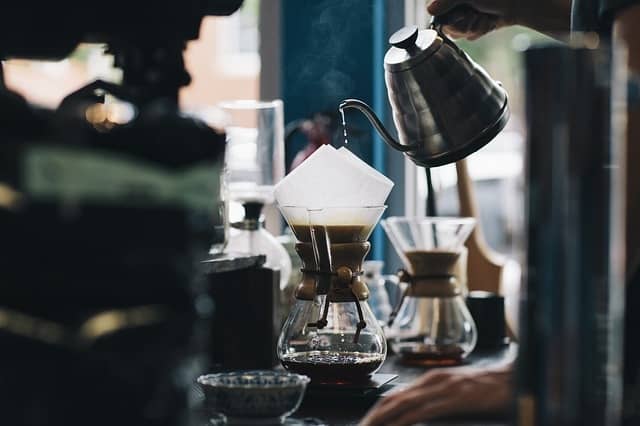


Best Bottled Water for Coffee
There are many types of bottled water available on the UK market. In the main there are two types which are sparkling water and still water. You should never use sparkling water for making coffee for pretty obvious reasons.
There are any number of brands available and most people that I have spoken with prefer Volvic as a brand for bottled water. That is because this brand has a neutral ph rating. Some buyers prefer the slightly cheaper Tesco Ashbeck.
There are plenty of other branded waters available. It is in my opinion worth trying them and see what you think of those. Start off with something cheap and see if you notice any difference.
If you do, and you prefer that taste, then you can try out other brands of the more expensive water.
Best Water ph for Coffee
Ideally the water should be completely neutral which is ph7. However and according to the Speciality Coffee Association of America, the pH for water should be between 6.5 and 7.5 is acceptable.
Water can also be slightly acidic or alkaline. In the UK drinking water will typically have a pH ranging anything from 6.5 to 9.5. Here are two good ways of thinking about this in a simpler way:
- Slightly acidic water is bad for extracting coffee but quite good for flavour. It will also cause limescale build up on the coffee equipment.
- Basic water is good for extraction but not so good for a full flavour.
Distilled Water for Coffee
Distilled water has hardly any mineral content (roughly 9 ppm), so using it for coffee preparation will result in a more bitter cup of coffee than you may be used to. Now opinion is divided as to the taste of the coffee. I have tried it and I found the coffee is very bitter.
I do like strong coffee, but not a huge fan of the bitter after taste. We all like slightly different tastes though, so this may work for you.
You always need to have a balance when using your water. A good guideline is that you should use water that you like to drink to make your coffee. Personally for me that is filtered water.
Distilled water, although not very expensive, is still more costly than normal bottled water.
Water Tips for Making Coffee
Here are some very basic water tips for making coffee:
- You should always use fresh water for every coffee brew - in other words don't leave the water sitting in your espresso machine, or top up any old water when making a brew
- Use filtered water and ideally with a TDS of between 50-200 ppm
- I would always recommend using a filter of some kind to help improve the quality of the water
- Try using bottled water to get pure water for better flavour
Hopefully I have been able to explain why water is an important ingredient in coffee. When I think of the many things that I have experimented with such as different types of beans, various roasts, different grinds etc, then changing the water is for sure the cheapest, and also the easiest one to try.
It is just worth a try, and you never know, you may have found an easy way to make great tasting coffee.

